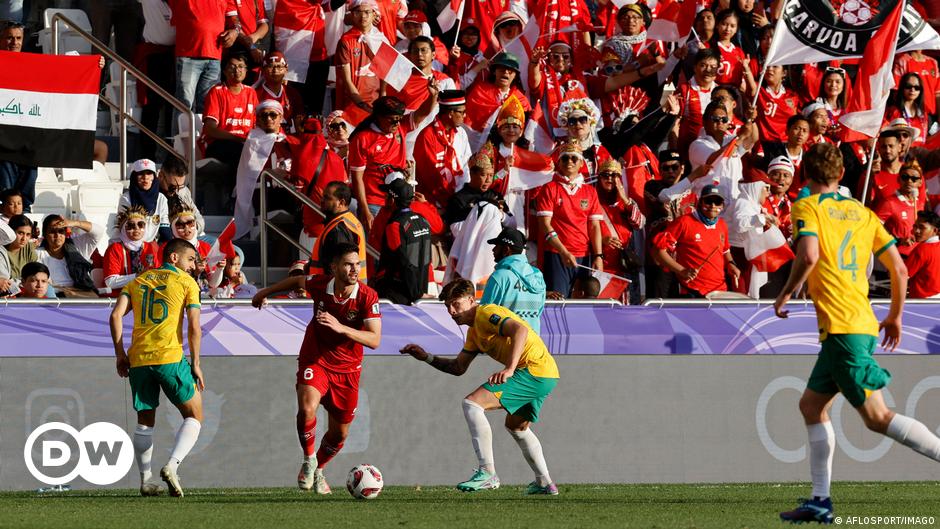Voting for Indonesia’s presidential election starts on February 14, and while the main issues are the economy, living standards, and moving the capital from Jakarta to the island of Borneo, none of the three candidates can ignore the national sport.
Anies Baswedan, Prabowo Subianto and Ganjar Pranowo know that when every vote counts, it is wise to stay onside with football fans. With 52 percent of the country’s population of 270 million consisting of people between 18 and 39, the sport is seen as an effective way to communicate with a huge part of the electorate.
“Football is an easy way for politicians to connect with young people,” Dex Glenniza, Head of Content at Indonesia’s largest podcast network Box2Box, told DW. “Many people take advantage of the power of Indonesian football.”
According to Usman Hamid, Executive Director of Amnesty International Indonesia, this special relationship has been ongoing ever since the country’s independence from the Netherlands in 1945.
“Politicians recognize the potential of associating themselves with a sport that resonates deeply with the public,” Hamid told DW.
The hopefuls
The three candidates have all been keen to show they love the game.
Prabowo, currently the Minister of Defence and running for president for a third time after twice losing to current president Joko Widodo (also known as Jokowi), set up the Garudayaksa Football Academy just outside Jakarta. Last month, he made headlines by signing a partnership with Qatar’srenowned Aspire Academy.
“Today marks a good start for the development of Indonesian football. Aspire Academy in Qatar was founded around 20 years ago, and we have witnessed Qatar’s progress in football. Qatar also successfully hosted the World Cup some time ago,” said Prabowo.
In January, Anies, wearing a football style shirt, spent almost two hours in a televised dialogue with fans and sports leaders about the development of the game. The four-party coalition he leads is called ‘Timnas’ or ‘National Team’, and given the former governor of the capital is also credited with helping build the Jakarta International Stadium, an 82,000 capacity arena that opened in 2022, Anies has perhaps the best football credentials.
Ganjar has appeared in billboards flanked by 30 legendary players from Persib Bandung, one of the country’s leading clubs. If that is old-style campaigning, then there are more modern ways to connect with millions of fans with all three making use of TikTok and Instagram.
“Young people are often active on social media platforms where discussions about football are prevalent,” said Amnesty director Hamid. “For example, many netizens are still discussing the national team which progressed past the group stage of the Asian Cup in Qatar for the first time and then lost to Australia in the Round of 16.”
Associating with success
All three candidates quickly expressed their congratulations at Indonesia for making football history.
Anies said that he was praying for victory but also accused the government on focusing too much on short-term results. “It must start with education, training and the country must be serious. So don’t let our attention only be during the match.”
On social media, Ganjar questioned whether a goal conceded should have stood, while Prabowo, said, “We have to support, and pray for our national team. Whatever the result, we will still support our national team.”
Advancing careers
Owning clubs can be another way to increase profile and popularity.
“There is a repetitive habit in the Indonesian football ecosystem, when the owner of a club wanted to win an election, the yearly budget of the club increased,” Jakarta-based fan Putera Kusumatoro told DW.
“This meant that more can be spent on signing top players and coach, renovating the stadium, etc, with the aim to win the league and attract the fans to vote for the owner.”
The sport can make anyone a national figure.
“Football events receive extensive media coverage, offering politicians a platform to enhance their visibility,” said Hamid. “Being associated with successful football clubs or attending high-profile matches, as always done by many politicians including President Jokowi, allows politicians to reach a wide audience and generate positive media coverage.”
Double-edged sword
Ganjar knows better than most that the nationwide passion for the game can be a double-edged sword for politicians.
Last March, he earned the enmity of fans as governor of Central Java when he called for a boycott of the Israeli team participating in the U20 World Cup,saying he supports the Palestinian independence cause.
Within days, world governing body FIFA stripped the country of what would have been the first ever global tournament to be held in Indonesia. The decision was met with widespread dismay, although later that year the country did host the U17 World Cup.
“Ganjar’s popularity was damaged because of that controversy,” said Glenniza, adding that the candidate has since been relatively quiet on football compared to his rivals. It is still a sore point, so much so that Indonesian standup comedian Kiky Saputri shared on social media that before she performed to Ganjar she had been told not to mention the U20 World Cup during her performance.
It is possible to bounce back, but the short-term damage that a football faux pas could inflict means it is best to play it safe so close to the vote.
Edited by: Jonathan Harding


